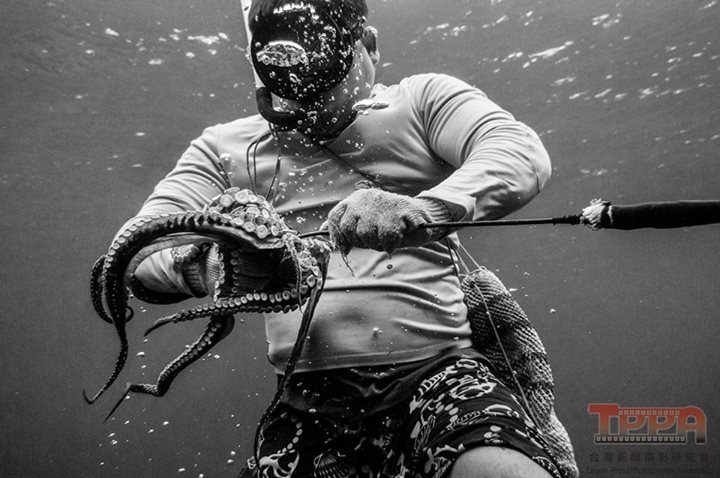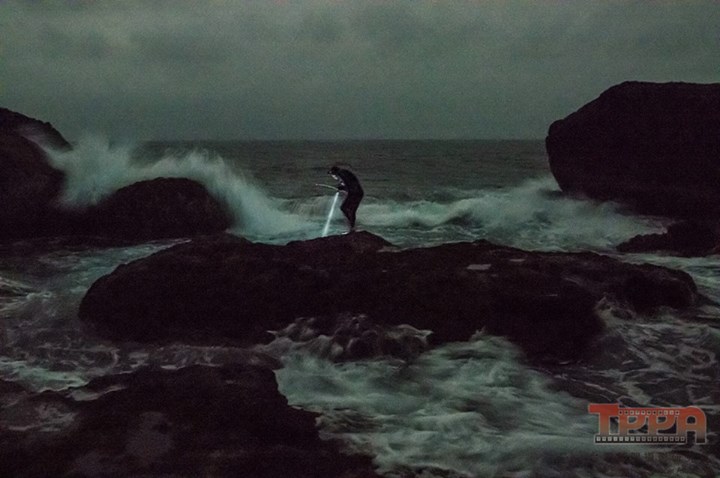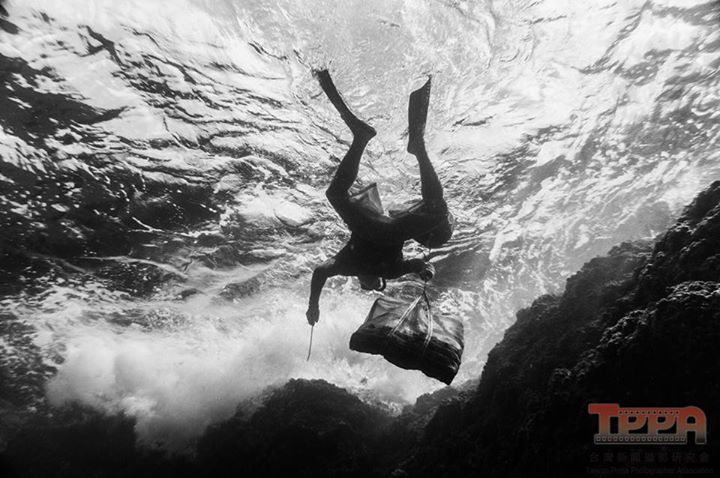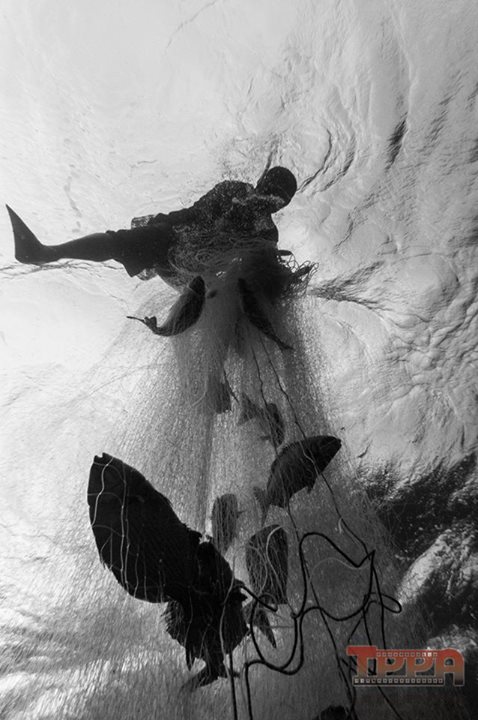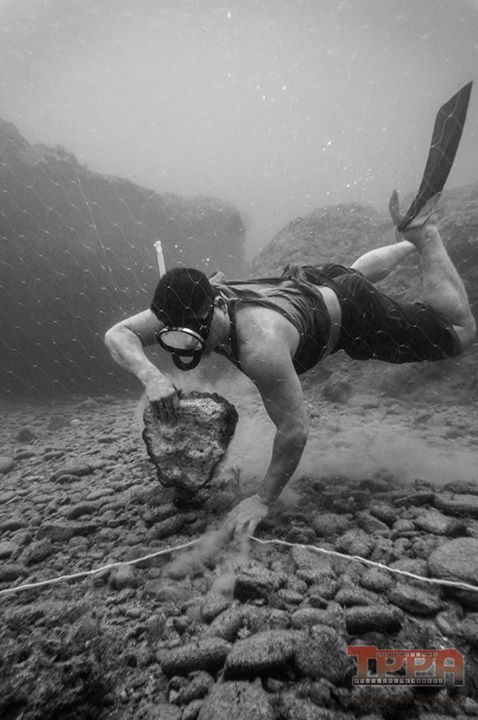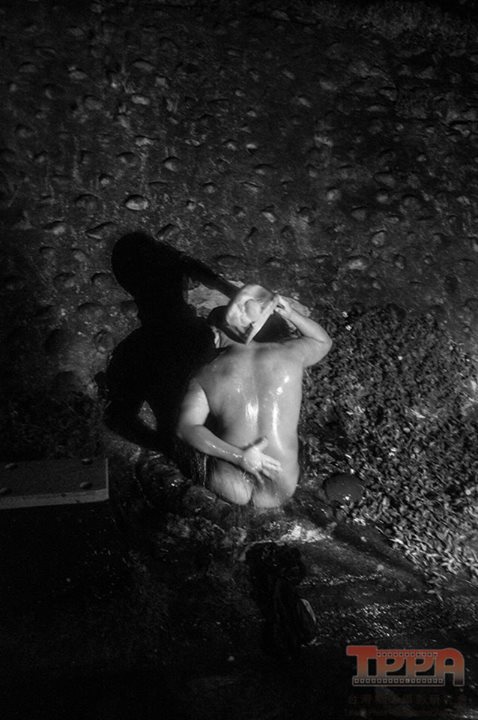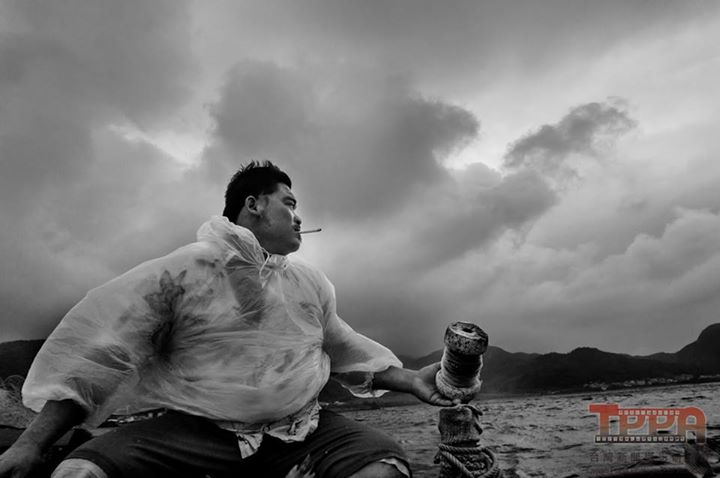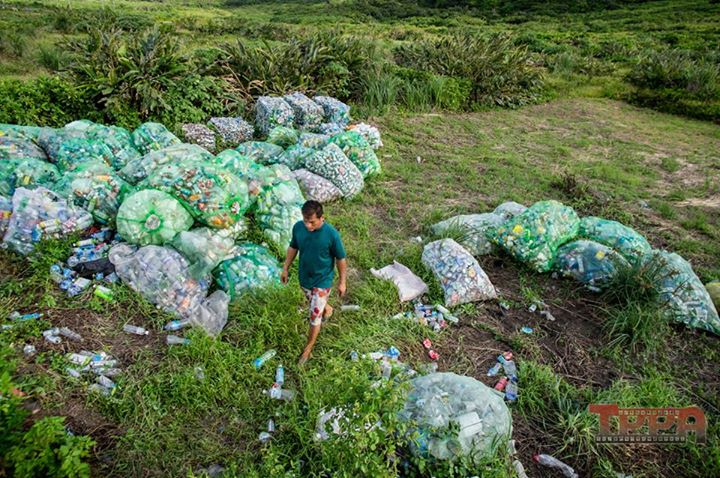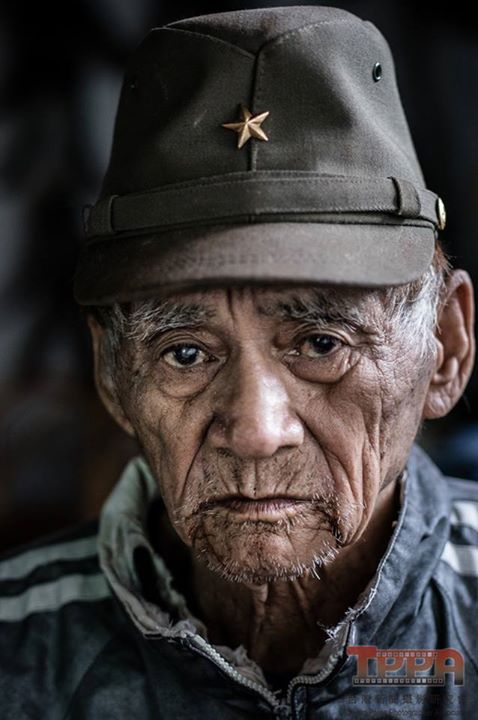The indigenous Tao people on Taiwan’s Orchid Island have long struggled to preserve their home and culture as the world around them changed.
In 2014, the island saw its first chain convenience store open. And in recent years, the island has become a popular tourist destination because of its beautiful coral reef and the Tao people’s distinctive culture.
Many are worried that the increasing number of tourists will only mean more trash and pollution, not jobs and income. The Tao have traditionally relied on fishing for survival, but that way of life is now under threat.
Wen-Yen Wang has regularly visited the island and captured the stories of the Tao people in a photo essay, which recently won awards in several categories in a national photo contest held by Taiwan News Photograph Study Group. Below are some of his photos and descriptions.
退潮的夜晚,一位蘭嶼人到海邊抓螃蟹。
他在黑色的礁岩上跳躍,浪花不時拍打上來,不見他什麼動作,手中卻已多了幾隻螃蟹。他偶爾也跳進水裡,尋找躲在水底岩縫中的龍蝦。
At night when the tides were low, an Orchid Islander went to the sea to catch crabs.
He jumped on black reef rocks. The waves crashed on the rocks from time to time. I did not see him move, but he had already grabbed some crabs with his hands. Sometimes he jumped into the water to find the lobsters hiding between the rocks under the water.
達卡安是位在蘭嶼新舊時代交替下典型人物,他從小就不愛上學所以識字不多,但卻是漁人部落中有名的海王子,對於海洋的知識極其豐富,許多蘭嶼人都會前來向他討教捕魚技術。 在傳統的達悟文化中,會抓魚的男性是女性絕佳的擇偶對象,但達卡安至今仍然單身一人,因為早已進入貨幣經濟社會的蘭嶼,對於男人的捕魚能力已不那麼看重。而達卡安即使徒手潛水抓魚功夫一流,在蘭嶼也無法靠此獲得什麼金錢收入,所以他也開始在飛魚季過後,到臺灣找尋工作賺錢。
Dakaan is a typical character who represents the transition between old and new ways of life on Orchid Island. He could not read much as he did not like to go to school when he was a kid. However, he is a famous ‘prince of the sea’ in the fishing village. He knows a lot about the sea, and many Orchid Islanders come to him to learn how to catch fish. In the traditional Tao society, a man who can catch fish is the best match for women. However, Dakaan is still single today, because the Orchid Islanders who step into the monetary economy do not value fishing skills anymore. Although Dakaan has a terrific ability to catch fish with his bare hands underwater, he cannot earn much money that way. As a result, he has started earning some extra money on the main island Taiwan after the flying fish season.
達卡安早上下海巡視他所設置的沉底網。
Dakaan goes to the sea in the morning to check the fishing net he set up on the seafloor.
達卡安在海浪拍打的岩岸邊,游泳撿拾蠑螺。
Dakaan swims between the reef and surface to collect turban snails.
達卡安正在將他所網獲的十多尾白毛魚收起。
Dakaan collects a fishing net with a dozen rudder fish in it.
為了設置沉底網,達卡安必須潛入6米多的海底,搬時[石]頭壓住網底。
To set up a fishing net on the seabed, Dakaan must dive to reach the 6-meter-deep bottom to fix the net with rocks.
在上浮至海面的途中,達卡安正與他方才捕捉的章魚搏鬥。
Dakaan fights with a freshly caught octopus on his way up back to the surface of the sea.
夜間潛水的達卡安,正在找出藏在岩洞內休息的魚。
Dakaan searches for fish hiding in the reef caves during a night dive.
在一個冬天夜潛結束後,達卡安使用山壁間的泉水洗澡取暖,即使在寒流來襲,他下海依然不穿任何防寒衣。
Dakaan washes himself in the river to warm up his body after diving during a winter's night. He does not wear the wet suit even when the cold front arrives.
在海上開船捕飛魚以及釣魚的達卡安。
Dakaan ridea a boat to catch flying fish and to fish.
飛魚季過後,在臺灣工作的達卡安沒有機會下海,與朋友吃飯以及唱歌成了唯一的娛樂。
After the flying fish season, Dakaan goes to Taiwan to work. Away from the sea, dining with friends and singing becomes his only entertainment.
阿文在蘭嶼長大,經營著雜貨店與機車租賃,雖然幾乎不下海,對於蘭嶼的海與土地,他卻比任何人更加關切與擔憂,深怕自己美麗的家鄉土地總有一天會因會環境破壞而消失。他開始續投入島上的資源回收工作,自己接洽的回收廠商,購入一台壓縮機,到全島各處放置網袋,甚至為此還買了一台貨車。每隔幾天就開著這輛貨車,去收回已裝滿瓶罐的網袋,並放置新的空網袋。 為了置放這些瓶罐,他還向那不贊成他作此事的父親要了一塊土地,把本來應該種植芋頭的良田,變成他的儲存場地。別人的田是種出芋頭地瓜,他的田卻是長出一堆垃圾。
Awen grew up on Orchid Island. He owns a grocery store and runs a motorcycle rental business. Although he rarely goes into the sea, he cares about the sea and the island more than anyone or anything else. He is worried that his beautiful homeland will disappear due to environmental destruction. He has started working on recycling: he contacts recycling companies, collects bags full of bottles and cans, and puts in new bags. He even bought a van for the endeavor. He drives the van to pick up the bags filled with bottles and cans and sets up new bags every few days across the island. To store these bottles and cans, he asked his father, who disapproves of his work, to give him a piece of land, which should be good for planting taros, as a storage site. Others’ plots of land grow taros and sweet potatoes, and his land grows trash.
江民軍是朗島部落的其中一為大船船主。傳統的蘭嶼船團組織是以家族為單位,而能擔任船主的人,除了要家族興旺,也必須受眾人敬重。現今因為社會文化變遷,傳統的船團組織早已不再,而碩果僅存的幾位大船船主年事都已高。
Min-Jun Jiang is the chief of a big ship in I-Raraley. Traditionally, fishing vessels in Orchid Island are run by family. The chief of a vessel has to be a respectful figure with a big family. As a result of social and cultural change, these kind of family vessels no longer exist. And the few vessel chiefs are all getting old.
Related articles:

